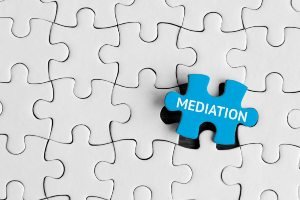 There are other ways to resolve a personal injury claim besides going to court. For example, you may be able to use mediation, which is one type of Alternative Dispute Resolution (ADR). Mediation may be mandatory or voluntary, depending on the facts of a case.
There are other ways to resolve a personal injury claim besides going to court. For example, you may be able to use mediation, which is one type of Alternative Dispute Resolution (ADR). Mediation may be mandatory or voluntary, depending on the facts of a case.
Our Charleston personal injury lawyers are prepared to help you through the process of mediation to try and maximize your compensation. Give us a call today to schedule a free initial consultation.
What is the Process of Mediation?
Before mediation begins, the disputing parties must select a mediator. This person is usually someone with knowledge of the law, typically a retired judge or lawyer. The mediator’s job is to act as a judge and jury of sorts, although he or she likely does not have the authority to mandate a settlement. Once the mediator is selected, the process may begin.
Opening Statements
Mediation begins with opening statements, which provide both sides an opportunity to present their arguments and state the reasons for the disagreements that prevented a settlement.
Gathering Information
Once the two arguments are presented, the mediator may ask follow-up questions to help gather more information about the case and each party involved.
Negotiating Terms of a Settlement
After collecting the necessary information to begin negotiations, the mediator usually works with both parties to negotiate a settlement agreement that will benefit both sides. This often involves going back and forth between both sides to determine what each side may be likely to agree to.
When Is Mediation Mandatory?
Mediation can be mandatory if a judge orders it after the victim files a lawsuit. However, most mediation is voluntary and there is no obligation to agree to a settlement if you are ordered to attempt to resolve your dispute in mediation.
Pros and Cons of Settling Through Mediation
One of the good things about going through the process of mediation before filing a lawsuit is that the two parties are provided an opportunity to see how an objective third party may view the case, which would essentially lead each side to re-evaluate their positions and weigh the risks of going to court.
Another reason that injury victims may choose mediation over going to court is for the privacy afforded to them during this process compared to the public record of a courtroom.
Mediation is probably going to be quicker and less costly than going to court since there are no filing fees and other expenses associated with a lawsuit. However, as this type of ADR grows in popularity, the more mediators are charging for their services, so it is important to speak to an attorney who has the resources to negotiate a lower fee for a mediator.
What if Mediation Fails?
If the mediator is unsuccessful in getting the opposing parties to reach a settlement, then the case may need to move forward to a jury trial.
With the threat of a lawsuit, some insurance companies may decide going to court is not worth the risk and may choose to offer a settlement after mediation fails but before the case ever makes it before a jury.
Call an Experienced Attorney for Answers to Your Questions
At Roden Law, our attorneys are committed to securing favorable outcomes for our clients in a cost-efficient manner. We want injury victims to receive maximum compensation for their injuries and damages.
We offer our services on a contingency fee basis, which means you do not pay us anything up front or while we work on your case. We only get paid when you receive compensation.
There is no risk in calling us and there is no obligation to take legal action.
